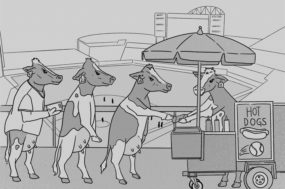I get questioned periodically (writing this column helps this along) to describe a “good” mechanic.
To answer that, I am going to share the advice of a colleague who said, “A good mechanic is someone who has torn up enough of his own stuff he can fix yours.” There is a lot of truth in those words, but gathering the extent of a mechanic’s experience in such matters can be elusive as well. People do not readily share mistakes, especially professional ones.
So what is a good farm mechanic? What do they look like and how can I find one … today?
A farm equipment mechanic is a highly skilled and trained technician who is called in by farmers and farm equipment dealers to perform repairs and regular maintenance on large and expensive pieces of machinery. As modern farms have grown in size, their need for complex machines capable of working hundreds of acres has grown as well.
As farm machinery has grown more powerful and more complex, the need for proper training as well as experience is a must. Just as many farms experience turnover in their employees, farm machinery dealerships have the same difficulties. The issue is: It costs the exact same amount of money to train an employee who will be gone in six months as it does to train an employee who will work at the dealership the rest of their career.
Many farm equipment mechanics will work for a farm equipment dealer, although some will have their own shop or work for a private repair firm. They will work mostly in a shop and work on machines brought in for repair. During the planting and harvesting seasons, mechanics will be especially busy, and they may be called out to a farm for emergency repairs.
A mechanic will begin by assessing a damaged piece of farm equipment, and then he or she will use their training and experience to discover what the problem is and take the necessary steps to repair the machine.
A farm equipment mechanic will need to have a thorough knowledge of the various machines used in the field, such as planters, tillers, spray equipment, tractors and other implements. They need to be able to take apart and rebuild these machines, be able to differentiate between working and nonworking parts, and know where to order the proper machine parts.
Farm equipment mechanics will also need to perform regular diagnostics on equipment to make sure these expensive pieces of machinery are kept clean and well oiled so as to last the farmer as long as possible. For this, a mechanic should demonstrate the ability to incorporate the latest technology to thoroughly analyze what the machine is doing or not doing.
Being able to correctly diagnose the issue also requires the mechanic not only be trained but also be up-to-date on the latest service bulletins and conditions under which the machine operates. Keeping accurate records on the lubrication and service schedules of your machinery will help the mechanic greatly.
Selecting a good mechanic may boil down to your own experience and expectations. Some observations can help. Is their workplace clean and well lit? Is the shop comfortably heated or cooled, and is a work schedule evident? While that might seem trivial, being able to tolerate work conditions may have a large bearing on your ability to receive your repaired machine in a timely fashion.
Is there evidence of recent training and up-to-date tools? Again, this might be tougher to evaluate, but it is unreasonable to think as tractors, combines and other machinery become more sophisticated the tools required to service and repair them will remain the same.
Are there several projects “in progress,” and are there signs headway is being made to get them out the door? This is a bit of a slippery slope. A good mechanic will always be busy, and waiting on parts is nothing new under the sun; however, you need to be able to have some idea on when your machine will be ready for service within reason.
While it may be hard to swallow at the time, a good mechanic may also turn you down for a requested repair. From experience, a good mechanic also knows what they do not know and will not experiment on your pricey equipment.
They may also turn you down because they know there is no way they can get your repairs done in time. Good mechanics are busy because they are good. To find a good mechanic, ask around and get other opinions, especially if their equipment lines are similar to your own. But be advised, if others know about them, it is a sure bet getting your equipment in and out will not likely be a same-day event.
As the son of a professionally trained mechanic, I will offer a final bit of insight. Generally speaking, about the only phone calls a mechanic gets are calls of desperation or anger. It goes a long way, if you find that jewel of a mechanic, that elusive creature, if you also call every once in a while to just say “hello” and “thank you.” ![]()
Andy Overbay holds a Ph.D. in ag education and has more than 40 years of hands-on dairy and farming experience.

-
Andy Overbay
- Extension Agent
- Virginia Cooperative Extension
- Email Andy Overbay







